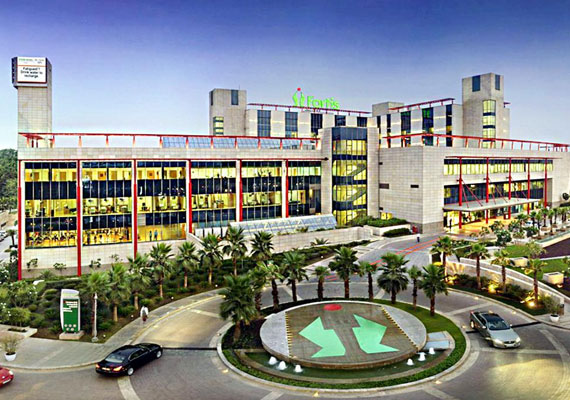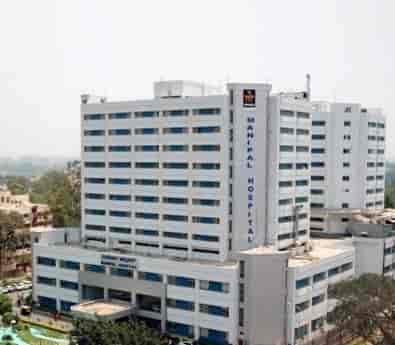Gastrointestinal Cancer Treatment in India
treatment
starting from
Gastrointestinal cancers
Overview
Gastrointestinal cancer is an umbrella term used for the entire gamut of malignancies that involve the organs of the digestive tract. These can affect anyone but have been found to be more common in males, especially elderlies. Gastrointestinal cancers account for about 26 per cent of cancers and contribute nearly 35 per cent when it comes to cancer-related mortality.
What are Gastrointestinal cancers?
Gastrointestinal is a term commonly used to describe any cancer that originates in the organs that together make up the gastrointestinal tract. It does not refer to any single malignancy but rather all the cancers that are related to the digestive tract, which starts from the oesophagus, ends at the anus, and also includes the stomach, large intestine, small intestine, pancreas, liver, rectum, and biliary system. The cancer is named after the organ in which cancer develops and the treatment is also planned depending on the same
Why choose Health Trip?
Health Trip gives you access to the finest healthcare services and facilities in India. You can plan your treatment with experts from various fields while sitting in the comfort of your home and get unparalleled assistance in tailoring your medical trip. India is a hub for blooming healthcare facilities, offering world-class, innovative treatment that is not only budget-friendly but also at par with excellence. With personalized approaches, multidisciplinary techniques and comprehensive care, we will help you walk on the journey to a healthier version of yourself.
What are the different types of Gastrointestinal cancer?
Gastrointestinal cancers are further classified into the following types:
- Oesophageal cancer - It develops in any part of the oesophagus, commonly referred to as the food pipe. The cancer is most commonly found in people above 60 years of age. It ranks 8th on the list of the most common cancers globally. In males, it ranks at 7th and in females at 13th.
- Stomach cancer - It is also known as gastric cancer and originates from the cells lining the stomach. It ranks 5th on the list of the most common cancers globally. In males, it ranks at 4th and in females at 7th.
- Gallbladder cancer - It is a highly aggressive cancer that develops in the gallbladder, the tiny organ, located just beneath the liver, that is responsible for storing the bile juice. It accounts for nearly 1,7 per cent of all cancer-related mortality.
- Colorectal cancer - The term defines not one but 2 types of malignancies that often develop together - colon cancer, which develops in the colon, i.e. the longest section of the large intestine and rectal cancer which begins in the rectum. Nearly 1.9 million people are diagnosed with the malignancy every year.
- Small intestine cancer - It is a very rare type of cancer that originates from the cells and tissues of the small intestine. It accounts for only 3 per cent of all gastrointestinal cancers
- Anal cancer - It is also quite rare and develops from the tissues of the anus. It has been found to be closely associated with the HPV virus and is characterized by a lump near the anus.
- Liver cancer - Also referred to as hepatic cancer, it is the 6th most common malignancy. Liver cancer is a highly aggressive cancer marked by the development of malignant cells in the liver. Hepatocellular carcinoma is the most common type of liver cancer in adults.
?Pancreatic cancer - The cancer develops in the cells that are present in the pancreatic duct, which is responsible for producing enzymes that regulate blood pressure. It accounts for about 3 per cent of all malignancies.
?Bile duct cancer - The cancer originates from the cells of the bile duct. It is very rare and most likely to affect elderlies.
What are the indications of Gastrointestinal cancer?
The symptoms of gastrointestinal cancer may not be the same for every patient. These vary from one patient to another depending upon various factors including the type of cancer, its stage, grade, age of the patient and medical history. However, since all these are likely to affect the digestive tract, certain symptoms may be common to all. These include:
- Severe pain or cramps in the abdomen
- Passing dark-colored stools
- Traces of blood in the stools
- Sudden and unexplained changes in the bowel habits
- Experiencing difficulty in swallowing food
- Experiencing problems related to digestion
- Developing jaundice-like symptoms such as yellowing of skin and eyes
- Feeling nauseated, especially after meals
- Bloated or swollen abdomen
- Fatigue and general body weakness
- Unexplained loss of weight
What causes Gastrointestinal cancers?
In the majority of cases, the underlying cause of gastrointestinal cancer is not known and it is believed to be triggered by abnormal mutations in the DNA of the cells, which could be the result of a variety of factors. It is these mutations that are responsible for the uncontrollable multiplication of cells. These abnormal cells tend to live longer than the healthy ones and as such get accumulated, resulting in the formation of a mass or lump, commonly referred to as a tumor.
What are the risk factors associated with Gastrointestinal cancers?
Various risk factors associated with gastrointestinal cancers include:
- Hepatitis A or hepatitis B infection
- H.Pylori infection
- Excessive smoking and alcohol consumption
- Obesity
- Having a personal or family history of GI cancer
- Polyps in the stomach
When should you consider going for the treatment?
You should go for immediate medical intervention as soon as you start experiencing any of the associated symptoms. These do not necessarily mean that you have cancer, however, timely medical assistance can help to diagnose and treat the malignancy at the earliest.
What treatments are available for Gastrointestinal cancers?
- Surgery - It involves the extraction of the tumor along with the removal of some surrounding healthy tissues. The procedure can be done via the conventional method, or by using laparoscopic or robotic techniques. Depending upon the size and location of the tumor, the doctors may remove the complete tumor or just a portion of it.
- Immunotherapy - The treatment directly targets the immune system of the patient and boosts it to fight cancer. This is usually given in combination with other treatments. The immune system can target the cancer cells to some extent, but as cancer progresses, the immune system is not able to cope. Immunotherapy can help to strengthen the immunity of the patient, making it healthy enough to fight the malignancy.
- Chemotherapy - It is a very common treatment modality that involves the use of certain drugs to target and destroy cancer cells. These drugs may either be given intravenously or orally. The goal of the therapy may vary from one person to another. It may be the primary treatment or given in combination with other treatments. Chemotherapy can help to shrink the size of the tumor prior to the surgery and destroy the remaining malignant cells post-surgery.
- Radiation therapy - It works somewhat similarly to chemotherapy, the major difference being that it uses radiation instead of chemicals and drugs. The radiations are directed towards the concerned area, either externally by using a machine or internally by placing radioactive material within the patient’s body.
How It Works
Need help in organizing medical travel to India?


















